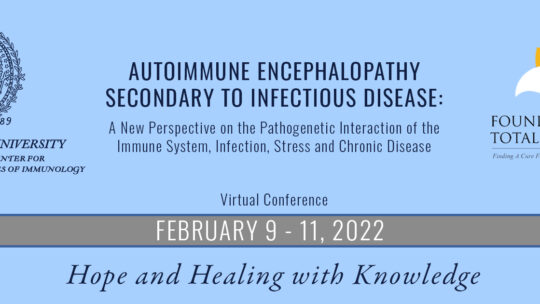Blog
Case Report – Pedijatrijsko autoimuno neuropsihijatrijsko oboljenje udruženo sa streptokokom
Pedijatrijsko autoimuno neuropsihijatrijsko oboljenje udruženo sa streptokokom
Pediatric Autoimmune Neuropsychiatric Disorder Associated with Streptococcal Infection
Jasmina Škorić1, Bojan Pavković1. 1 Dom zdravlja Dr Simo Milošević’, Beograd, Srbija
http://prevped.preventivnapedijatrija.rs/index.php/casopis/article/download/41/24
Conclusion: The patient showed signs of improvement after the intravenous administration of immunoglobulin which confirmed the underlying immunological aspect of the disease. Additionally, serologic test results that showed elevated antistreptolysin O titer and antideoxyribonuclease–B titer indicated streptococcal etiology. Precisely, these misdirected antibodies set off an inflammatory response that led to the basal ganglia damage resulting in behavioral changes, motor, cognitive and emotional disorders.
PANDAS in an Adult?: A Case Report
PANDAS in an Adult?: A Case Report. Deshmukh RP, Mane AB, Singh S.Ind J Priv Psychiatry 2022; 16 (1):44-45. DOI: 10.5005/jp-journals-10067-0104
“We report a case in order to suggest that we should be alert while assessing OCD in young patients, as it might be secondary to streptococcal infection. This has therapeutic implications. Trials of immunomodulator therapy can be given as suggested in a few kinds of literature. Although still experimental, it may have potential for the future, especially in those not responding to conventional treatment… This report might suggest that PANDAS-like syndrome may occur in adults also. We should be cautious of this syndrome during treatment.”
Neuroinflammation in a Rat Model of Tourette Syndrome
Neuroinflammation in a Rat Model of Tourette Syndrome, Zhongling Ke, Yanhui Chen, Guofeng Chen, Yanyan Liu, Neuroinflammation in a Rat Model of Tourette Syndrome, Frontiers in Behavioral Neuroscience, Vol 16, Front. Behav. Neurosci., 10 March 2022, DOI: 10.3389/fnbeh.2022.710116
Conclusion: The IDPN-induced TS rats had significant neuroinflammation in the brain, and the interaction between dopamine (DA) dysregulation and immune dysfunction may play a vital role in the pathogenic mechanisms of TS.

Washington State PANS PANDAS Updates
Washington House Resolution 4653 Passed Bill Information: HR 4653 – 2021-22- Honoring patients and families affected by PANDAS/PANS. Bill Status Link: Washington.Gov Link Bill Language:...
Therapeutic Apheresis and Immunosuppression in Immunologic Diseases: A Review and Own Observations
Bambauer R, Schiel R. Therapeutic Apheresis and Immunosuppression in Immunologic Diseases: A Review and OwnObservations. Clin Immunol Res. 2021; 5(2): 1-36. ISSN 2639-8486
“TA should be reserved for treatment of children and adolescents
who are severely affected by PANDAS. In such patients, it
appears to be safe, well-tolerated, and beneficial treatment
option [130]. Bien et al reported in 2020, besides the first-line
interventions of steroids, IVIG, and TA as second-line treatments
cyclophosphamide or rituximab [131].”
Abnormal mTOR Activity in Pediatric Autoimmune Neuropsychiatric and MIA-Associated Autism Spectrum Disorders
Trifonova, E.A.; Mustafin, Z.S.; Lashin, S.A.; Kochetov, A.V. Abnormal mTOR Activity in Pediatric Autoimmune Neuropsychiatric and MIA-Associated Autism Spectrum Disorders. Int. J. Mol. Sci. 2022, 23, 967. https://doi.org/10.3390/ijms23020967
Abstract: Autism spectrum disorder (ASD) is a neurodevelopmental condition characterized by
the early onset of communication and behavioral problems. ASD is highly heritable; however,
environmental factors also play a considerable role in this disorder. A significant part of both
syndromic and idiopathic autism cases could be attributed to disorders caused by mammalian
target of rapamycin (mTOR)-dependent translation deregulation. This narrative review analyzes both bioinformatic and experimental evidence that connects mTOR signaling to the maternal autoantibody-related (MAR) autism spectrum and autoimmune neuropsychiatric disorders simultaneously. In addition, we reconstruct a network presenting the interactions between the mTOR signaling and eight MAR ASD genes coding for ASD-specific maternal autoantibody target proteins. The research discussed in this review demonstrates novel perspectives and validates the need for a subtyping of ASD on the grounds of pathogenic mechanisms. The utter necessity of designing ELISA-based test panels to identify all antibodies related to autism-like behavior is also considered.

Lyme and tick-borne diseases: A primer for mental health practitioners
Trunzo, J. J., Statlender, S. M., Leventhal, J. G., Reece, L., Berenbaum, S., & Bransfield, R. (2022). Lyme and tick-borne diseases: A primer for mental health practitioners. Practice...

From IVIG to PEX to Rituximab to Helminths to treat PANS
Before We have four kids; two have PANS. Charlie’s came on like a freight train in the summer of 2010 at age 5. Maddie’s PANDAS was a slower unfolding until...

PANDAS is Autoimmune Encephalitis
"Pediatric Autoimmune Neuropsychiatric Disorder Associated with Streptococcal infection or PANDAS can also be called post-streptococcal autoimmune basal ganglia...

Conference: Autoimmune Encephalopathy Secondary to Infectious Disease
Register to Watch Virtually Conference videos are available until May. Please note, if you are having problems accessing the conference, please first check your spam folder for an email...

It took me 12 years to get a proper mental health diagnosis. That needs to change | Mental Health Perspectives
The Seattle Times By Leah Penney, Mental Health Perspectives guest columnist “A few weeks after my 6th birthday, I went to bed one night a happy, healthy child, and I...